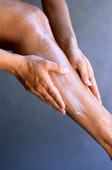- Could Your Grocery Store Meat Be Causing Recurring UTIs?
- Are You Making This Expensive Thermostat Error This Winter?
- Recognizing the Signs of Hypothyroidism
- 10 Strategies to Overcome Insomnia
- Could Artificial Sweeteners Be Aging the Brain Faster?
- Techniques for Soothing Your Nervous System
- Does the Water in Your House Smell Funny? Here’s Why
- Can a Daily Dose of Apple Cider Vinegar Actually Aid Weight Loss?
- 6 Health Beverages That Can Actually Spike Your Blood Sugar
- Treatment Options for Social Anxiety Disorder
Nighttime Leg Cramps Peak in Summer, Study Says


Nighttime leg cramps occur twice as often in summer as in winter, a new study suggests.
The malaria drug quinine is commonly prescribed to treat leg cramps, so researchers looked at quinine prescriptions written for more than 31,000 people in British Columbia, Canada, over six years.
The researchers also analyzed the frequency of online searches about leg cramps by people in Australia and the United States.
Prescriptions for quinine in British Columbia and online searches about leg cramps in the United States peaked in July. Online searches about leg cramps in Australia were highest in January, which is mid-summer in that country.
The study was published recently in the Canadian Medical Association Journal.
“Although there are anecdotal reports of pregnancy-associated rest cramps being worse in summer, these findings establish the phenomenon of seasonality in rest cramps in the general population,” wrote Dr. Scott Garrison, of the medical faculty at the University of Alberta, and the Center for Hip Health and Mobility at the University of British Columbia, and colleagues.
The findings could lead to changes in treatment for people with nighttime leg cramps, the researchers said.
“In countries where quinine is still in widespread use as prophylaxis for nocturnal leg cramps despite safety warnings (e.g., Canada and the United Kingdom), physicians may choose to counsel patients to take a ‘quinine holiday’ during the 6 colder months of the year,” the study authors said in a journal news release.
Although widely used to treat nighttime leg cramps, quinine is not recommended for routine treatment because of safety concerns, Dr. David Hogan, of the University of Calgary, wrote in an accompanying editorial.
Patients should first be prescribed a four-week course of quinine to determine if it works, and should be told to stop using the drug periodically, he said.
“The merit of a ‘quinine holiday’ during the colder months, as suggested by Garrison and colleagues, becomes moot if patients are not prescribed the agent in the first place or are periodically advised to try stopping it,” Hogan wrote.
More information
The U.S. Food and Drug Administration warns about the risks of using quinine to treat leg cramps.
Source: HealthDay
Copyright © 2026 HealthDay. All rights reserved.










